Introduced in 2010, EWIPR has become an annual fixture on the national education calendar with the number of cities covered by the survey increasing from six to 17 this year. Moreover EW’s consistent advocacy of professionally administered early childhood care and education has influenced NEP 2020, writes Dilip Thakore & Summiya Yasmeen
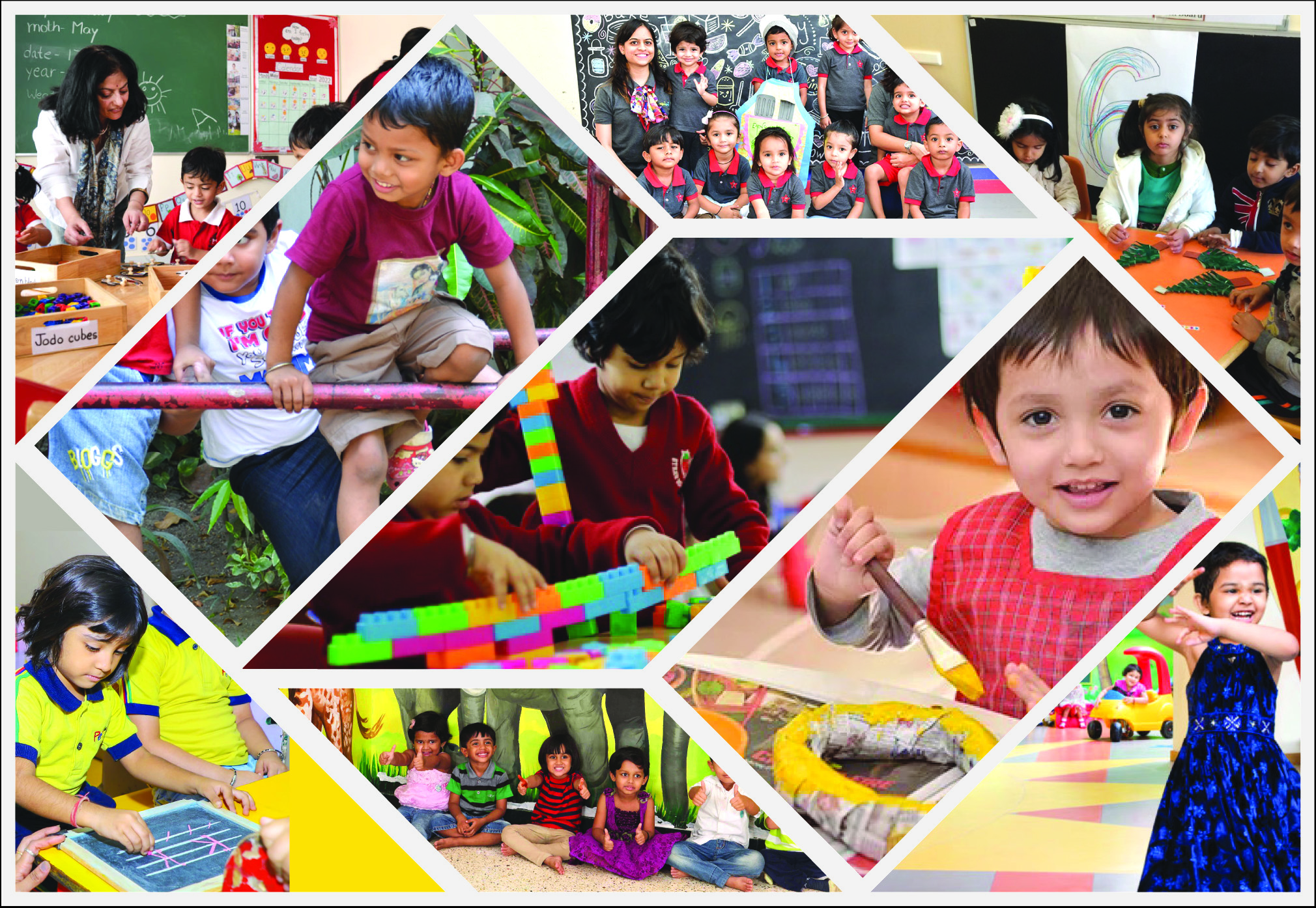
The privilege of infants of a thin upper crust urban minority for over six decades after independence, universal professionally provided early childhood care and education (ECCE) holds a special place in the hearts and minds of the editors of EducationWorld.
Inspired by Los Angeles-based philanthropist Lowell Milken, also promoter-director of Knowledge Universe Llc which in the early decades of the 21st century owned Kinder Care — America’s largest chain of private pre-primary schools (over 2,000) — in 2010 we convened India’s first international ECCE conference in Mumbai at which pre-primary education experts from around the world alerted educationists, parents and educators about the critical importance of professionally administered ECCE. Simultaneously in 2010, we introduced the pioneer EducationWorld India Preschool Rankings in which we ranked the Top 10 pre-primaries in India’s six largest cities.
Since then, the EducationWorld India Preschool Rankings (EWIPR) have become an annual fixture on the national education calendar, published without interruption for the past 13 years, while the number of cities covered by the survey has increased to 17 countrywide. Evidently, EW’s persistent advocacy of universalisation of ECCE has impacted government and the academy, if not parents communities, to the vital importance of professionally provided ECCE.
The new National Education Policy (NEP) 2020 has completely reconfigured the centuries-old 10+2 primary-secondary school system into a new 5+3+3+4 system to tag on three years of compulsory ECCE for every child countrywide, merging three years of pre-primary learning with primary education, aka foundational education. Read together with the landmark Right of Children to Free & Compulsory Education (RTE) Act, 2009 which mandates free and compulsory education for all children in classes I-VIII (ages 6-14), after NEP 2020, unanimously approved by the Union Cabinet on July 29, 2020, free education is now compulsory for all children from ages 3-14 countrywide.
“Over 85 percent of a child’s cumulative brain development occurs prior to the age of six, indicating the critical importance of appropriate care and stimulation of the brain in the early years in order to ensure healthy brain development and growth. Presently, quality ECCE is not available to crores of young children, particularly children from socio-economically disadvantaged backgrounds. Strong investment in ECCE has the potential to give all young children such access, enabling them to participate and flourish in the educational system throughout their lives. Universal provisioning of quality early childhood development, care, and education must thus be achieved as soon as possible, and no later than 2030, to ensure that all students entering grade 1 are school ready,” says NEP 2020, echoing advocacy consistently advanced by EducationWorld.
To maintain EducationWorld’s established tradition of rating the country’s best preschools for the benefit of parents with young children — and teachers aspiring to make careers in ECCE — we commissioned our long-standing partner, Centre for Forecasting & Research Pvt. Ltd (C fore, estb.2000), the well-reputed Delhi-based market research and opinion polls company to conduct a field research survey in 17 cities (where there is sufficient awareness of the importance of pre-primary education) viz, Delhi, Mumbai, Chennai, Kolkata, Bangalore, Hyderabad, Pune, Navi Mumbai, Thane, Ahmedabad, Chandigarh, Jaipur, Gurugram, Noida, Bhubaneswar, and Ghaziabad.
“In all, 8,173 people were interviewed. Sample respondents consisted of SEC (socio-economic category) ‘A’ parents with at least one child in preschool, teachers, and principals of various pre-primary schools. Every respondent was shown a list of high-profile preschools in their city. They were requested to rate preschools they were aware of on a ten-point scale under ten parameters of pre-primary education excellence. These parameters are competence of faculty, teacher welfare and development, curriculum and pedagogy, infrastructure, individual attention to students, value for money, leadership/management quality, parental involvement, special needs education and safety and hygiene. Schools assessed by less than 25 respondents were not considered for ranking. The scores awarded by sample respondents were multiplied by ten and totaled to rank preschools in the selected 17 cities,” says Premchand Palety, promoter-CEO of C fore. An alumnus of the Panjab Engineering College, Chandigarh, Palety served in ORG, India’s pioneer retail market research firm for over a decade prior to promoting C fore in the millennium year. C fore’s clients include Nestle, Mint and the Congress party.
In the following pages, we present parameter scores and league tables ranking Top 10-20 pre-primary schools in proprietary and franchised categories in 17 cities countrywide.
With Paromita Sengupta, Reshma Ravishanker & Baishali Mukherjee
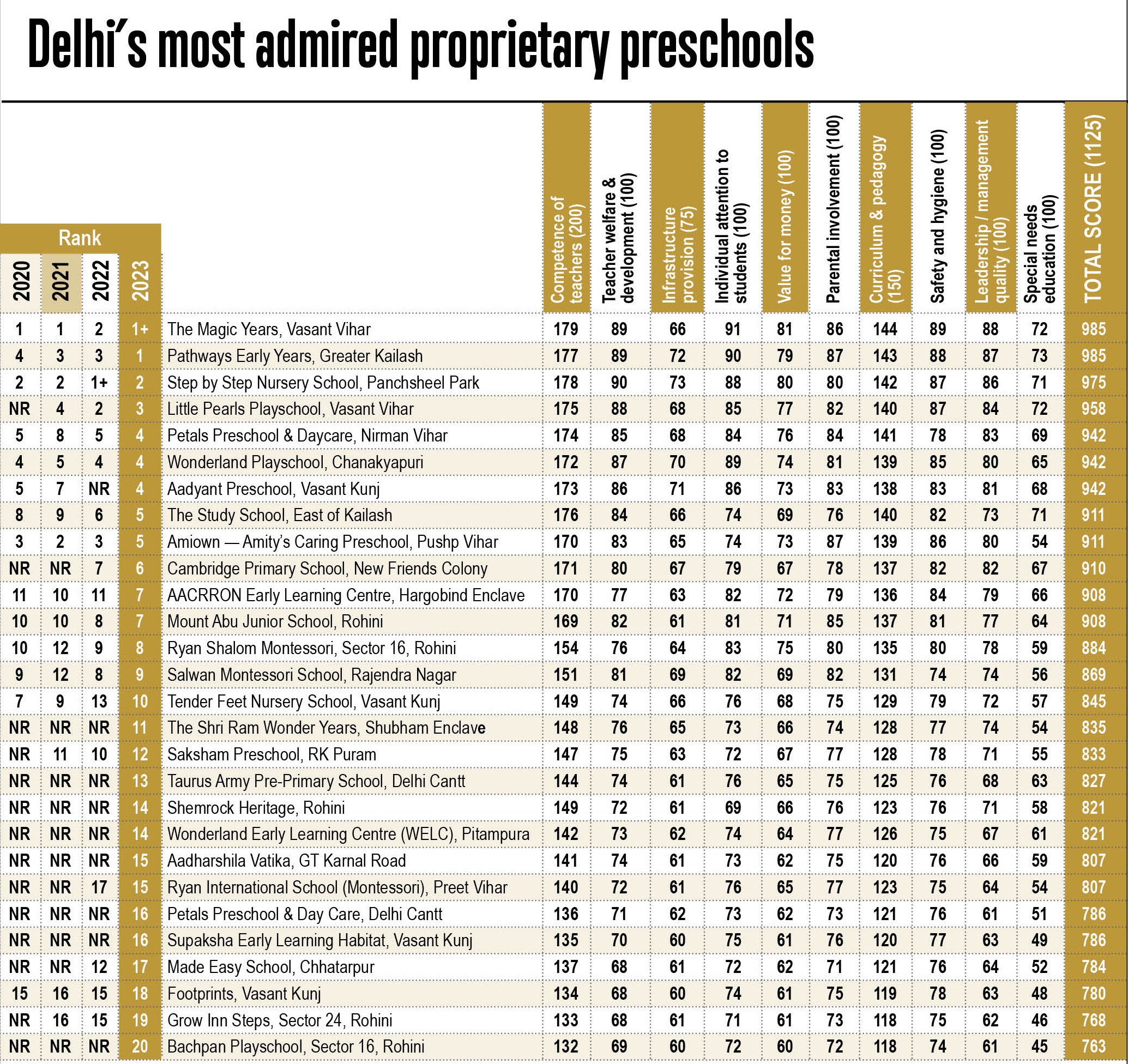
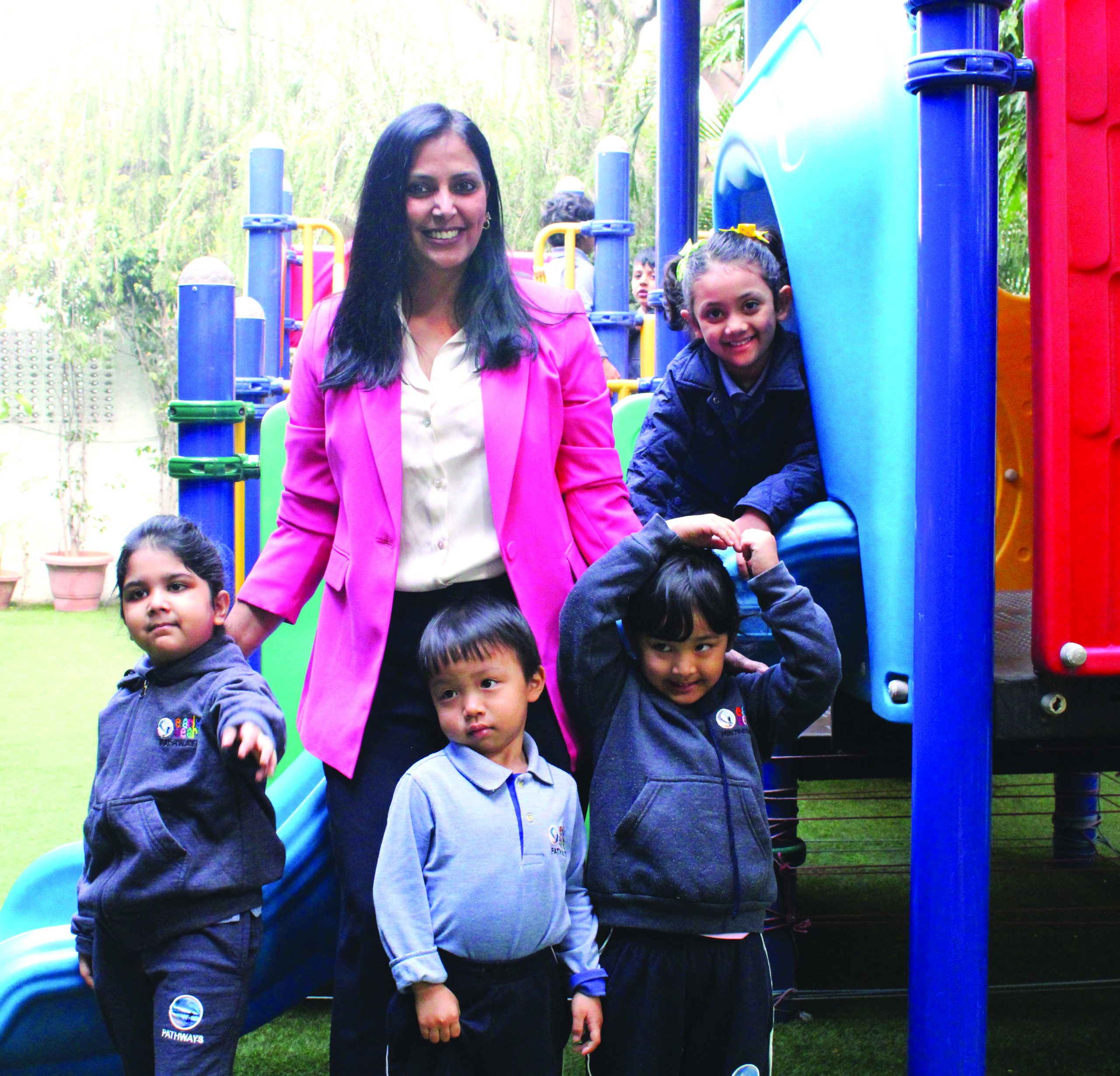 “We are thrilled that we’re ranked Delhi’s #1 proprietary preschool in the comprehensive EW survey. It is a testament to the commitment and efforts of our dedicated team to create a nurturing environment which facilitates holistic development of children. The high ranking under several parameters including curriculum and pedagogy, special needs education, individual attention to students, parental involvement, and infrastructure provision, is truly gratifying. While all parameters are important to offer a well-rounded educational experience, we particularly value individual attention to students, recognising its foundational role in fostering meaningful early years learning. We are excited to share that we are working on initiatives focused on social, emotional, and ethical learning. This reflects our dedication to continually enhance our ECCE programmes” — Natasha Tholia, Principal, Pathways Early Years, Greater Kailash
“We are thrilled that we’re ranked Delhi’s #1 proprietary preschool in the comprehensive EW survey. It is a testament to the commitment and efforts of our dedicated team to create a nurturing environment which facilitates holistic development of children. The high ranking under several parameters including curriculum and pedagogy, special needs education, individual attention to students, parental involvement, and infrastructure provision, is truly gratifying. While all parameters are important to offer a well-rounded educational experience, we particularly value individual attention to students, recognising its foundational role in fostering meaningful early years learning. We are excited to share that we are working on initiatives focused on social, emotional, and ethical learning. This reflects our dedication to continually enhance our ECCE programmes” — Natasha Tholia, Principal, Pathways Early Years, Greater Kailash
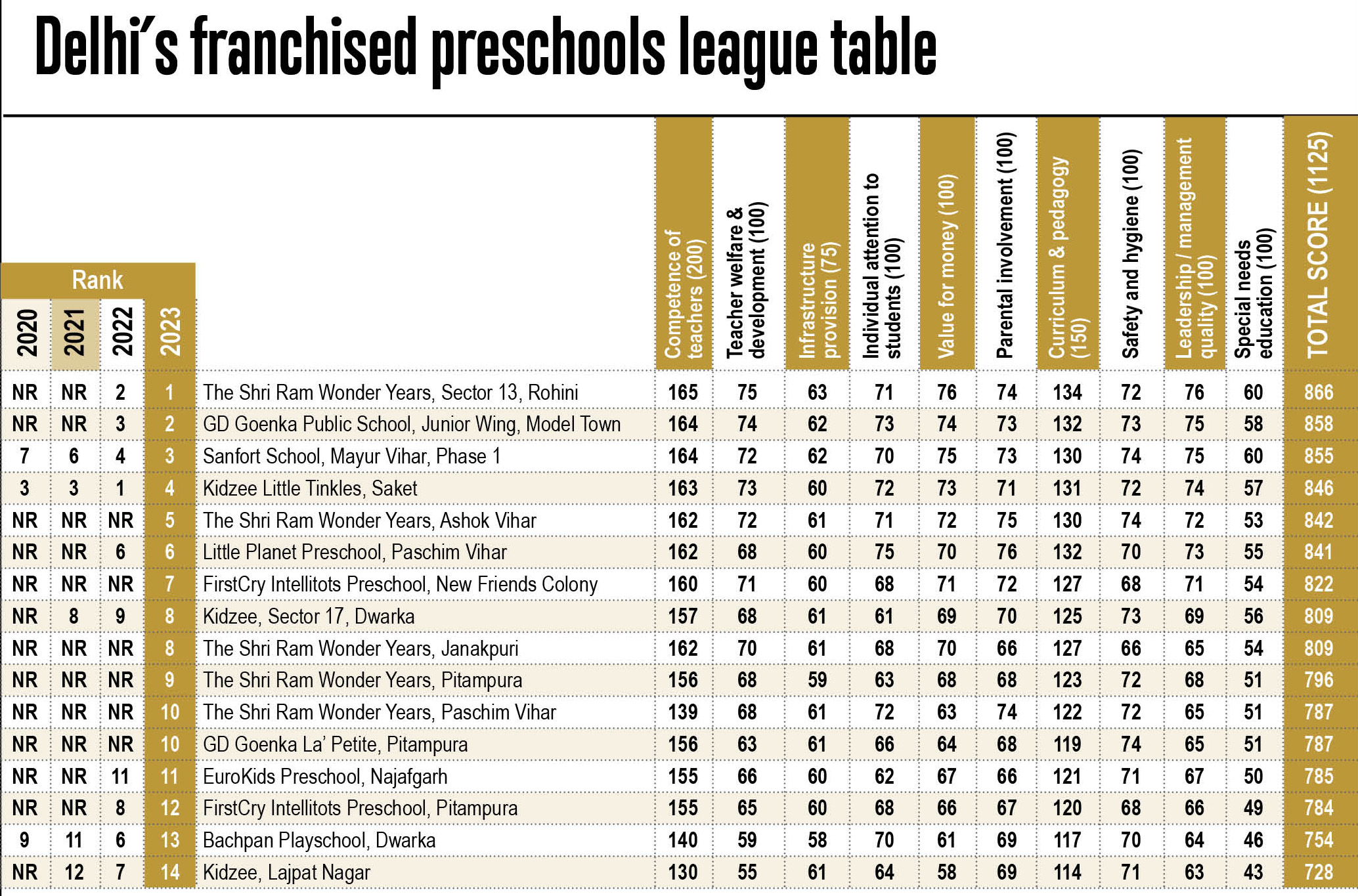
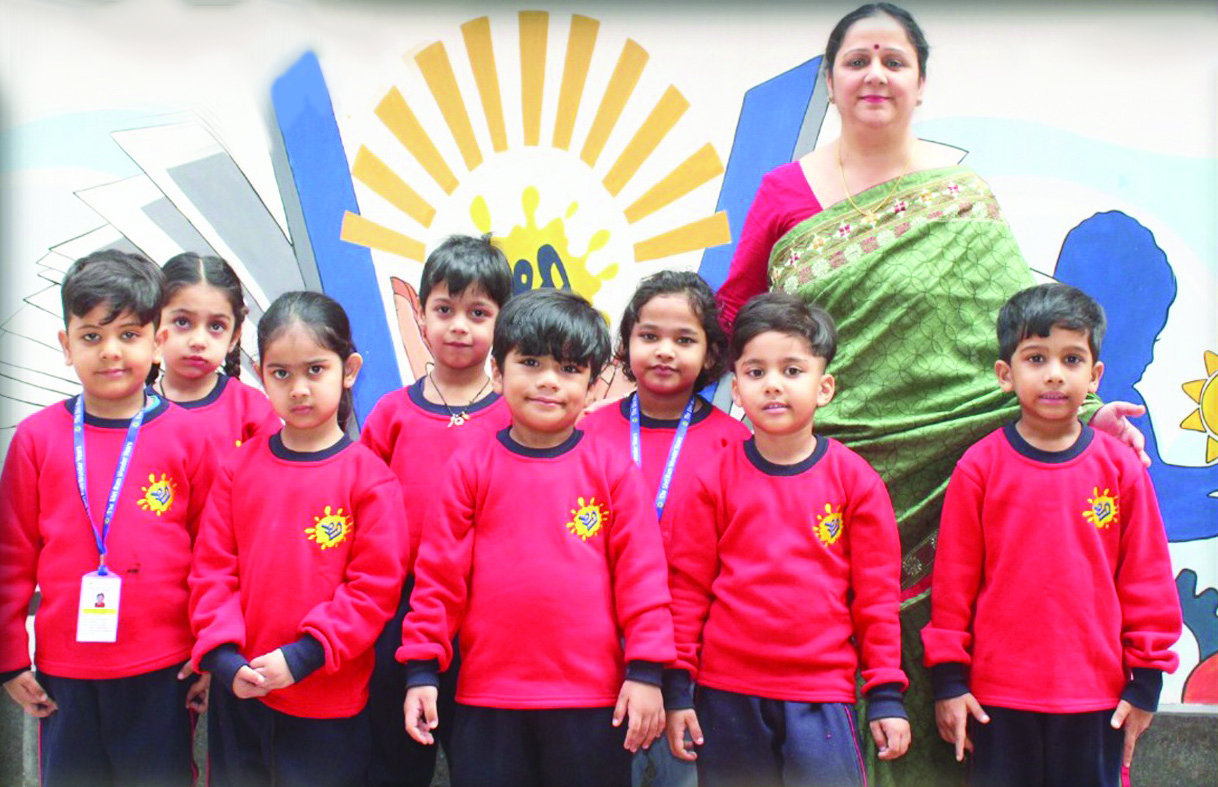 “The news that we are ranked Delhi’s #1 franchised preschool fills our hearts with pride. It reinforces our commitment to providing best early childhood educational experiences to our children. After studying EW’s 2022-23 rankings table, we made a conscious effort to improve under every survey parameter. I thank our teachers, management and parents, and our children for their enthusiasm and encouragement. We pride ourselves on our joyful and stress-free learning environment, state-of-the-art infrastructure including an auditorium and garden, well-trained facilitators and an integrated curriculum designed to develop children’s intellectual, physical, and creative skills. These distinctive features provide a strong foundation for further education certain to nurture well-rounded individuals. This explains our top scores under almost all your survey parameters” — Shubhi Soni, Head of School, The Shri Ram Wonder Years, Sector 13, Rohini (175 students and 20 teachers)
“The news that we are ranked Delhi’s #1 franchised preschool fills our hearts with pride. It reinforces our commitment to providing best early childhood educational experiences to our children. After studying EW’s 2022-23 rankings table, we made a conscious effort to improve under every survey parameter. I thank our teachers, management and parents, and our children for their enthusiasm and encouragement. We pride ourselves on our joyful and stress-free learning environment, state-of-the-art infrastructure including an auditorium and garden, well-trained facilitators and an integrated curriculum designed to develop children’s intellectual, physical, and creative skills. These distinctive features provide a strong foundation for further education certain to nurture well-rounded individuals. This explains our top scores under almost all your survey parameters” — Shubhi Soni, Head of School, The Shri Ram Wonder Years, Sector 13, Rohini (175 students and 20 teachers)
Parameters of Excellence: Delhi’s Top 10 Preschools
To compile the ew india preschool rankings 2023-24 league tables of early childhood care and education (ECCE) institutions, 1,000 preschools were shortlisted by EducationWorld, of whom 661 were sufficiently well-known to be assessed by the respondents database comprising 7,575 SEC (socio-economic category) ‘A’ parents with at least one child in preschool, and 1,080 principals/teachers, across 10 parameters of ECCE excellence.
Sample respondents in 17 cities were asked to rate preschools in their civic limits on 10 parameters — competence of teachers, individual attention to children, value for money, leadership quality, parental involvement, curriculum and pedagogy, infrastructure, safety and hygiene, and teacher welfare and development.
The scores awarded under each of these 10 parameters were aggregated to rank the most preferred preschools under two categories — proprietary and franchised — in 17 cities. The rankings of Delhi’s Top 10 preschools (across proprietary and franchise preschools) under each parameter of ECCE excellence are set out below.
“Our reaction to Podar Prep, Pali Hill being ranked Mumbai’s #1 proprietary preschool for the fourth year in a row is of satisfaction, elation and jubilation. It is validation of our commitment to provide highest quality early learning and development support to our children. Our top scores on several of the survey parameters including individual attention to students, parental involvement, safety and hygiene and curriculum and pedagogy is recognition of the continuous investment we have made in these areas. Podar Prep provides a carefully designed developmentally appropriate curriculum — Kiducation — which is fully aligned with NCF for Foundational Stage 2022. Our new initiative is the Immersive SPA — Sensory Processing Activities — programme to develop the eight intelligences of our children. We highly value the EducationWorld ranking as it recognises the parameters that make a preschool successful for parents and children”
— Dr. Swati Popat Vats, President, Podar Education Network, which has 490 proprietary and franchised preschools countrywide (Podar Prep, Pali Hill: 120 children and 18 teachers)
“I am honoured and humbled by the recognition conferred on Podar Jumbo Kids, Mahavir Nagar as Mumbai’s #1 franchised preschool. We are fortunate to have renowned early childhood educator Dr. Swati Popat Vats and the entire Podar team to guide us. In Podar preschools, we accord high priority to the continuous professional development of our teachers who are trained in latest pedagogies encompassing design thinking, storytelling, STEAM, inclusive education, etc. We also implement a carefully designed curriculum which combines with play-based teaching-learning. I am delighted that your survey respondents have appreciated this harmonious blend of competent teachers, individual attention students, parental involvement, and a robust curriculum and pedagogy by awarding us top scores under these parameters.”
— Sangeeta Gupta, Director, Podar Jumbo Kids Plus, Mahavir Nagar (195 students and 21 teachers)
“Our entire Spring Buds team is pleased and proud to receive this honour for the second year in a row. This recognition validates our collective efforts and underscores our unwavering commitment to deliver high-quality early childhood education. I believe our top rank is the outcome of several factors including a well-rounded curriculum, innovative teaching, individualised attention to children, competence of faculty and active management involvement. All these factors have combined to create a joyful and stimulating learning environment where every child is mentored to develop foundational learning, social and emotional skills. Therefore, I am not surprised that we have been awarded highest scores for teacher competence, individual attention to students and leadership/management quality. We are planning to expand and establish new preschools in Thane as well as around the country”
— Sandeep Goenka, Trustee, Spring Buds International Preschool, Kapurbawdi (620 students and 48 teachers)
“It’s very gratifying that we have retained our #1 rank in Navi Mumbai. In particular, our top scores under the parameters of faculty competence, curriculum and pedagogy, and individual attention to students are very satisfying. I attribute this consistent good showing to our age-appropriate, innovative curriculum and activity-based pedagogies which focus on nurturing youngest children’s all-round growth and development and fostering love for learning. All this is underwritten by our state-of-the-art child-friendly infrastructure including creative play areas and cheerful classrooms. Our goal is to continuously innovate, learn and improve our early childhood education pedagogy and practices to develop creative, well-rounded children prepared for future learning and life”
— Shikha Jain, founder-principal, Perfection International Kids Preschool, Kharghar (100 students, 9 teachers)
“We are overwhelmed and thankful that the hard work and efforts of the entire Swarnim team has been appreciated. It’s also very gratifying that we have been awarded top scores under several critical parameters of early childhood education excellence including competence of teachers, curriculum and pedagogy, individual attention to students and parental involvement. Evidently, our investment in rigorous teacher training in contemporary ECCE practices and to implement the child-centric curriculum and hands-on activities recommended by NEP 2020 is paying off. Our objective is to provide holistic well-rounded foundational education to prepare our children for future learning and life”
— Swati Sarawagi, Resident Director, Swarnim International Preschool, NSC Bose Road (135 children and seven teachers)
“We are delighted with the honour bestowed on us. Since the first EW survey in 2010, this preschool has been consistently ranked within the Top 10 in Kolkata, and this year we have achieved the ultimate #1 rank. Our distinguishing feature is that our teachers provide a child-centric and joyful environment where every child receives individual care and attention. All of our teachers are highly experienced and trained in Montessori pedagogy. I believe the excellent quality of our teachers is the primary reason for our success and prolonged goodwill with parents. That’s why I am not surprised that we are top-ranked on the parameters of competence of teachers, individual attention to students, and parental involvement”
— Soma Chandra, Principal, EuroKids Preschool, BB Block, Salt Lake (100 students and eight teachers)
“We are ecstatic. Many thanks to your sample respondents for voting us Chennai’s #1 preschool. I dedicate this award to our teachers for their innovative teaching through a variety of active pedagogies to stimulate curiosity, creativity and joy within children. Introduction of special days such as Animalagic, No bag day, Quintessence of Learning, and Grandparents’ Day stimulate the socio-emotional development of youngest children. We believe all the ten EW survey parameters play a key role in children’s rounded development. Currently, we are brainstorming to create new digitalised experiential learning programmes for preschoolers using synchronous and asynchronous tools”
— Rohini Vachar, centre head, Vaels International School (Nursery & Primary), Neelankarai (250 students and 33 teachers)
“We are thrilled and honoured by this recognition. Our deepest gratitude to the entire Podar Jumbo Kids, Thoraipakkam team. This top ranking among Chennai’s franchise preschools is the outcome of our holistic approach to early childhood education, dedicated and committed staff, innovative teaching-learning and strong focus on whole child development. We are proud that PJK, Thoraipakkam has excelled under several parameters of preschool education excellence. Our primary aim is to deliver the best ECCE experience to our future nation builders. Looking ahead, we intend to incorporate the latest and best global early childhood learning practices and multiply our efforts to provide our children an enriching learning environment”
— Annie Anthony, franchisee owner, Podar Jumbo Kids Plus, Thoraipakkam (60 students and 7 teachers)
“We are delighted to receive this recognition. It’s validation of our progress towards achieving our ambitious founding vision to ‘Transform the Early Years’. Kai is India’s first standalone preschool to be accredited by the International Baccalaureate and authorised to offer a dual international curriculum, which integrates the IB-Primary Years Programme with Montessori pedagogy. All our teachers are specially trained to deliver this unique dual-international curriculum. Our top score under infrastructure underscores the priority we have accorded to learning environment as the third teacher. We invested almost two years to carefully plan, design and build our award-winning 2-acre international preschool campus providing over 20 wonder-filled indoor and outdoor learning environments where children learn through inquiry, exploration, play and interaction. The next phase of our plans is to develop a professional learning institute at Kai. Our aspiration is to make a positive impact by leading change to create wide-spread awareness of the importance of early childhood education, and to set new standards in high-quality childcare and preschool education practices.”
— Saad Sait, Co-founder & Executive Director, Kai Early Years, Whitefield (144 students and 20 teachers)
“We are delighted and honoured that we are ranked Bengaluru’s #1 franchised preschool. I attribute this achievement to our dedicated staff, supportive parents, and incredible students. Maple Bear Canadian’s curriculum harmonises best Canadian early childhood educational practices with local cultural values, providing a nurturing environment for children to thrive academically, socially, and emotionally. Our highest scores under the important parameters of competence of teachers, infrastructure, value for money and curriculum and pedagogy confirms our capability to deliver holistic education through experiential pedagogies. In particular, our top score for competence of teachers is very satisfying as educators are the cornerstone of children’s education”
— Ritu Handa, Principal/Director, Maple Bear Canadian Preschool, RMV 2nd Stage (150 students and 14 teachers)
“We are thrilled that CHIREC, Jubilee Hills is ranked Hyderabad’s #1 proprietary preschool for the third successive year. This recognition validates our team’s commitment to continuously develop our play-based, innovative curriculum that addresses the physical, emotional, social and intellectual development of our children. CHIREC’s vision is to develop and empower young minds to become ready for global challenges and new age technologies. For CHIREC, progress under every EW parameter is vital for children’s holistic development. Currently, we are focused on introducing best global practices, and addressing perceived shortfalls in our operations”
— Iffat Ibrahim, Principal, CHIREC, Jubilee Hills (243 students and 45 teachers)
“It’s an honour to be ranked Hyderabad’s #1 franchise preschool for the second consecutive year. It’s the consequence of the passion and diligence of Team Birla Open Minds Preschool and our high level of motivation to improve continuously. The high happiness quotient of our children, teachers and parents and our futuristic curriculum are also contributing factors. In my opinion, all parameters of preschool education excellence should be accorded equal importance for achieving all-round growth and success. We are in the midst of introducing new pedagogical practices in tune with students’ requirements, skill development activities and building a stronger foundation for teaching-learning processes”
— Huda Azam (centre), centre head, Birla Open Minds Preschool, Jubilee Hills (85 students and 15 teachers)
“We are proud and grateful to your respondents for ranking us Pune’s #1 proprietary preschool. It’s the outcome of the unwavering commitment of our team to provide exceptional early education to our children. Our high scores under all ten parameters of early childhood education are acknowledgement of the joyous, stimulating, nurturing environment we provide to our children. Our teachers are provided continued professional development education to hone their competencies and skills, and given full freedom to innovate in the classroom. Elpro First Step’s curriculum has also been carefully researched to meet children’s diverse learning styles and implemented through play-based pedagogies. And we actively involve parents in their children’s ECCE years through regular communication, workshops, and activities.”
— Aarti Kanwal, Principal, Elpro First Steps, Chinchwad (523 students and 60 teachers).
“Last year when we were ranked #2, we started work to improve under all the EW survey parameters. Therefore we are thrilled that our hard work, dedication, and commitment to early childhood education excellence has paid off. Now our well-designed and comprehensive curriculum focuses on development of children’s cognitive, social, emotional, mathematical, and motor skills, and is delivered by well-trained teachers through play-based pedagogies that encourage creativity, problem-solving, and critical thinking skills. Therefore it’s especially gratifying that Podar Jumbo Kids, Wakad is top-ranked on the parameters of faculty competence, curriculum and pedagogy and especially individual attention to students. We thank our parents community for reposing their trust in us.”
— Vartika Srivastava (left) & Veena A. Patil, franchise owners, Podar Jumbo Kids, Edden Road, Wakad (250 students and 20 teachers)
“I’m extremely grateful to your well-informed sample respondents for voting us Ahmedabad’s #1 proprietary preschool for the second consecutive year. I am truly humbled by this recognition made possible by the continuous efforts of Team Vedant to deliver holistic all-round education with deep focus on special needs education, values-based learning and contemporary pedagogies. While all the EW parameters of preschool education excellence are vital, we value competence of faculty most because finally an education institution is as strong as its faculty. Fostering community engagement and expanding outreach programmes are at the centre of our future plans”
— Rutvi Vyas, founder, Vedant International Preschool, Maninagar (600 students and 40 teachers)
“Being ranked Ahmedabad’s #1 preschool calls for celebration. It provides an opportunity to set new goals and continue providing exceptional educational experiences to our children. Vedant International’s steady rise in the EW league table is the result of our highly qualified and caring teachers, innovative teaching and provision of a safe and stimulating learning environment. We believe in holistic education with focus on balancing a combination of parameters of preschool education excellence. We are currently trying to establish a continuous assessment and feedback system to monitor each child’s progress. In the near future, we intend to curate socio-emotional well-being and mindfulness programmes, and focus on creating flexible learning environments, sustainability and environment education”
— Manasi Doctor (right), centre head, Vedant International Preschool, South Bopal (220 students and 15 teachers)
“We are very grateful to EducationWorld and your knowledgeable respondents for appreciating our efforts to set up a green oasis in this fast urbanising city. Being voted Gurugram’s #1 proprietary school has fostered a sense of pride and unity within the Beansprouts community, highlighting the positive impact of collective effort. It also gives us an opportunity to give the best possible start to our young learners with renewed commitment and vigour. I believe our success can be attributed to our collaborative approach, futuristic thinking, creation of a child-centric learning environment, innovative curriculum, and effective communication with our stakeholders. We value our top score for parental involvement the most among all parameters of preschool education excellence — we ensure the meaningful engagement of parents and grandparents through various activities. Regular parent-teacher meetings are also conducted to discuss the development of all children. Through constant improvisation and adaptation, we will strive to provide a safe and friendly environment where the seeds of learning sprout, enriching young minds and preparing them for a sound future”
— Soumya Gulati, Co-founder, Beansprouts Pre-Primary, Gurugram (160 students and 25 teachers)
“We are elated to be ranked Gurugram’s #1 franchise preschool. We thank EducationWorld, C fore, and survey respondents who have voted us Gurugram’s #1 franchise school for the fifth year since 2017-18. I am also delighted with our top scores under the parameters of competence of faculty, parental involvement, and ever-evolving curriculum and pedagogy. We believe young learners are like sponges. With every new experience, every word they learn, and every behaviour they adopt, they are investing in a bright future. Therefore, individual attention to students to make them aware of their capabilities and strengths, the quality of learning environment and availability of appropriate experiences are crucial determinants of the way every child’s brain architecture develops. This year, we have enriched our curriculum to include STEM activities for our young learners and plan to update our workbooks based on Multiple Intelligences and include more self-development activities to enhance their confidence”
— Deepali Karnwal (centre), franchisee, Shri Ram Wonder Years, Gurugram (115 students, 15 teachers)
“We are overjoyed to be ranked Noida’s #1 proprietary preschool. This award underscores our faculty’s competence and depth of curriculum and pedagogy. Quite appropriately the EW survey respondents have awarded us our highest score under the parameters of competence of faculty and curriculum and pedagogy. We follow the Montessori pedagogy and our teachers take pains to involve parents to reinforce Montessori practices at home to gradually make children independent. More important, our curriculum extends beyond the confines of classrooms to develop children’s exploration and critical thinking skills through experiential learning”
— Sunjeet Kaur, Head of School, The Ardee School, Sector 100, Noida (66 students, 7 teachers)
“Our heartfelt gratitude to your survey respondents for ranking Kangaroo Kids, Sector 34, Noida’s #1 franchised preschool for the fifth successive year. Credit must be awarded to the collective efforts of teachers, management, parents and children for maintaining and sustaining high-quality ECCE standards. Our consistent top scores under the parameters of competence of faculty, curriculum and pedagogy, and individual attention to students are also very satisfying. We are blessed to have excellent, dedicated teachers who go beyond the call of duty to implement our holistic curriculum through engaging activities to ensure children develop not just foundational numeracy and literacy but also problem solving, communication, social and emotional skills”
— Sharmila Chatterjee, Principal, Kangaroo Kids International Preschool, Sector 34 (178 students, 18 teachers)
“We are delighted that we are ranked Bhubaneswar’s #1 preschool for the fifth consecutive year in the prestigious EW survey. This is a testament to the visionary leadership of our Founder-Chairman, the late Dr. Bijaya Kumar Sahoo, who insisted on building a nurturing and joyful environment for youngest children. This excellent foundation and our efforts to consistently innovate and incorporate latest ECCE pedagogies is the secret of our success. The SAI Angan curriculum is constantly evolving to enable children’s multi-sensory development and learning of social skills. Moreover, we place special emphasis on safety and hygiene to ensure children have a safe, secure and clean learning environment. I thank your knowledgeable survey respondents to acknowledge the efforts of our teachers and staff”
— Dr. Silpi Sahoo, Chairperson, SAI International Group of Institutions (454 students and 63 teachers)
“It’s good to know that the hard work of teachers and the trust of parents has been recognised by EW survey respondents. Our single minded focus is on delivering highest quality early childhood education to serve as a solid foundation for a lifetime of learning and ethical living. The top scores awarded to us on nine of the ten survey parameters are encouraging, validation of best practices we have been following for over two decades. They include a collaborative learning approach, keeping abreast of latest pedagogies and trends in early childhood education, investing in the continuous training of our educators and teaching assistants, involving parents in school activities and providing every opportunity to children to express themselves and explore the world around them”
— Atul Khanna, Director, Strawberry Fields Play School, Sector 24B (345 students and 20 teachers)
“We are delighted that Sanfort, Vasundhara has regained its #1 rank in Ghaziabad. We were disappointed last year when we were ranked second. This year’s EW sample respondents have acknowledged the Sanfort Group’s dedicated service for over two decades in the field of early childhood education and our sustained effort to provide world-standard teaching-learning experiences to youngest children. Sanfort, Vasundhara is the group’s mother branch and a pioneer in innovating engaging and meaningful early years education. Our dedicated team of teachers is ever ready to accept new challenges and they have ensured that our curriculum and pedagogy has been specially designed to enable all-round development of children in a joyous learning environment. Following implementation of NEP 2020, we have upgraded our curriculum, pedagogies and infrastructure, introduced digital classrooms, activity and evidence-based learning pedagogies and adopted a tech enabled parent-school communication system”
— S.K. Rathor, Founder-Chairman, Sanfort Group of Schools (Vasundhara: 218 students, 19 teachers)
“Being ranked Bhopal’s top preschool for the second consecutive year is a privilege and honour for us in DPS, Kidszone. While there is temptation to rest on our laurels, we intend to sustain our top rank. I believe it is DPS, Kidszone’s happiness quotient, sustained focus on differentiated instruction and collaboration, safe and positive school climate and culture of parent involvement that has impressed your sample respondents. We are delighted with our high scores under several parameters but value our top score under individual attention to students most. To acquaint them with digital literacy and 21st century skills, our kindergarteners will soon be introduced to robotics, coding, STEM-based activities, environmental awareness and accelerated numeracy skills”
— Mukta Sharma (right), vice principal, DPS Kidszone (DPS Bhopal), Neelbad (236 students and 29 teachers)
“We are thrilled that we are consistently ranked Jaipur’s #1 pre-primary. This recognition endorses and celebrates the success we have achieved in creating a nurturing learning environment for children. Our top scores on the important parameters of competence of teachers, curriculum and pedagogy, and leadership/management quality are attributable to our well-trained teachers, who use innovative pedagogies and continuously upgrade curriculums to deliver personalised learning. We are now working towards aligning our curriculum with the International Baccalaureate Primary Years Programme framework”
— Jaya Singh, Principal, Jayshree Periwal International School
Top-ranked anganwadis in 3 metros
Since 2018 EW has been ranking the best government-run anganwadis in Mumbai, Delhi and Bengaluru with the objective of their serving as role models for the country’s neglected 1.34 million anganwadis
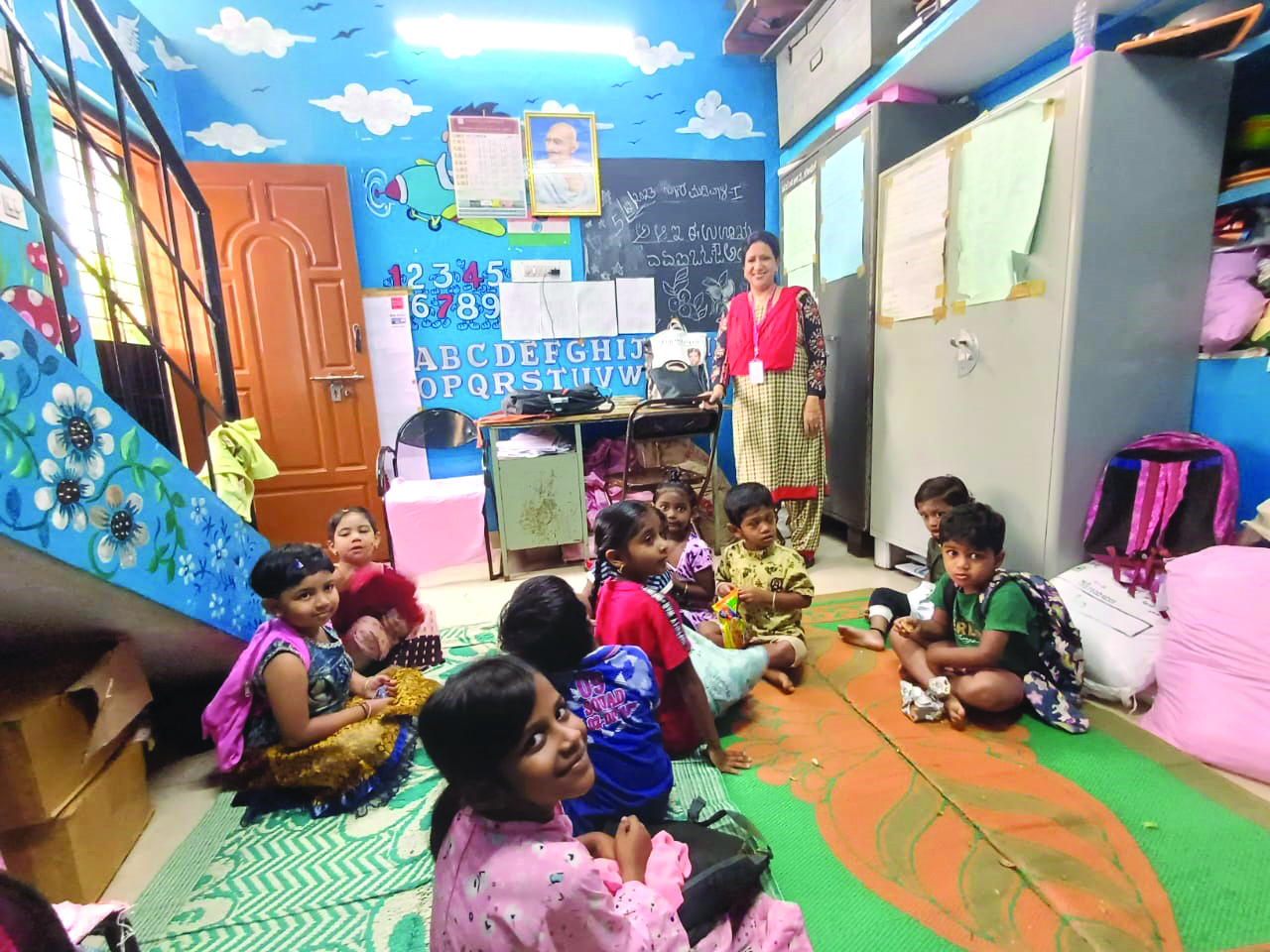 The challenge in Indian education is to radically improve teaching-learning not only for middle class children in fees-levying private schools, but also for children in neglected free-of-charge government schools which grudgingly host 52 percent of the country’s 260 million in-school children. In 2018, in the cause of supporting the Central government’s ICDS (Integrated Child Development Services) programme (estb. 1975), EducationWorld introduced the first-ever ranking of government anganwadis — essentially nutrition centres for lactating mothers and children in the age group 0-5 years from poorest households, which are also mandated to provide early childhood education — in Mumbai, Delhi and Bangalore to serve as models for the country’s 1.34 million anganwadis.
The challenge in Indian education is to radically improve teaching-learning not only for middle class children in fees-levying private schools, but also for children in neglected free-of-charge government schools which grudgingly host 52 percent of the country’s 260 million in-school children. In 2018, in the cause of supporting the Central government’s ICDS (Integrated Child Development Services) programme (estb. 1975), EducationWorld introduced the first-ever ranking of government anganwadis — essentially nutrition centres for lactating mothers and children in the age group 0-5 years from poorest households, which are also mandated to provide early childhood education — in Mumbai, Delhi and Bangalore to serve as models for the country’s 1.34 million anganwadis.
However in 2020, because of the pandemic lockdown of all education institutions including anganwadis, the rankings were discontinued for two years — 2020-21 and 2021-22. With resumption of in-person learning across the education spectrum, anganwadi rankings in these metros was resumed in 2022-23 and is continued in 2023-24. To rate and rank the best in these three metros, field researchers of the Delhi-based market research company Centre for Forecasting and Research (C fore) interviewed a specially constituted database of 469 sample respondents comprising anganwadi teachers and SEC (socio-economic category) ‘C’, ‘D’ and ‘E’ parents in Delhi, Mumbai and Bengaluru.
“Sample respondents were asked to rate anganwadis that they were aware of under six parameters on a ten-point scale. These parameters were competence of teachers, infrastructure, individual attention to children, nutrition/child care, safety and hygiene, and leadership quality. Preschools assessed by less than 25 persons were eliminated from the rankings exercise. All the parameters are given equal weightage except competence of faculty which is given double weightage,” says Premchand Palety, chief executive of C fore explaining the rankings methodology especially devised for government anganwadis.
In the Union Budget 2023-4, the Central government allocated Rs.20,554 crore for the ICDS programme — a mere Rs.2,569 per child per year for the estimated 80 million infants enrolled in the country’s 1.34 million anganwadis. This sum of Rs.214 per month per child is clearly inadequate to provide nutrition, let alone professionally administered ECCE.
Ab initio, EducationWorld has been demanding and has also repeatedly published a detailed roadmap coterminously with presentation of the Union Budget for mobilizing an additional Rs.110,000 crore for the ICDS programme (see https://www.educationworld.in/union-budget-2023-24-260-million-children-shortchanged-again/), to little avail. But with the National Education Policy 2020 having mandated compulsory professionally provided ECCE for all children in the age group 3-5, there is widespread expectation that the Union Budget 2024-25 will make larger provisioning for early childhood education.
Meanwhile, in the pages following, we present league tables ranking the top anganwadis in Mumbai, Delhi and Bengaluru. The objective of this limited exercise is to acknowledge the good work being done by these role models with the hope that the budgetary allocation for India’s short-changed anganwadis will be increased.
Also read: EW India Preschool Rankings 2022-23

























